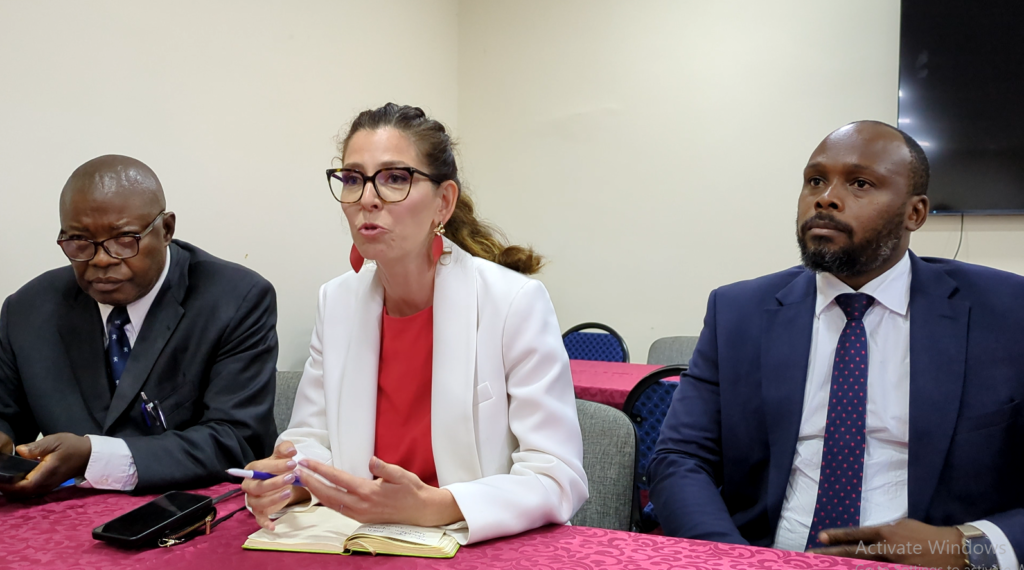By Kemo Cham
The Global Vaccine Alliance (GAVI) wants the Sierra Leone government to increase its share of the financial cost of procuring childhood vaccines in the face of dwindling donor support.
A GAVI official said increasing the country’s share of the cost of procuring lifesaving vaccines is crucial to sustain current gains in immunization and bridge the gap in coverage. Maria Padkina, Senior Country Manager for GAVI, suggested a progressive increase in the locally sourced funding, noting that it is also vital for the country to assume national ownership of its immunization programme.
Sierra Leone is ranked among the best performing countries in terms of vaccine coverage, and this has been largely due to support it receives from GAVI, a public-private partnership that works to increase access to immunization in poor countries.
“Sierra Leone has achieved remarkable progress in immunization – more than 90 percent coverage,” said Ms Padkina. “Now the focus for us is the discussion on how we can sustain those gains and how we can reach every child no matter where they are born or where they live with lifesaving vaccines.”
Padkina, who is based in Geneva, Switzerland, was speaking on a panel on Monday, October 13th – one of several events organized as part of the 2025 Joint Appraisal of Sierra Leone’s immunization programme.
The GAVI delegation met with stakeholders and conducted site visits to four of the country’s 16 districts. According to Padkina, since the beginning of the partnership with Sierra Leone, GAVI has provided over USD250 million in support to the country. She disclosed that its current portfolio amounts to USD59 million, catering for procurement of vaccines, solar powered fridges and other cold chain equipment designed to protect the vaccines, as well as provision of technical assistance and specific interventions aimed at reaching zero dose children.
“For us to sustain this high coverage and to make sure that all the children are reached, the support of the government and the commitment of the government to immunization, progressive increase in domestic financing for immunization will be essential,” she said during the panel hosted by Health Alert, one of the leading civil society partners of GAVI.
“GAVI will remain a strong partner of Sierra Leone, but to ensure long term sustainability, especially in the current global resource constraint environment, national commitment and national ownership will be essential,” Padkina stressed.

Public health experts consider immunization as one of the best investments any country can make for its citizens. A GAVI estimates show that one US Dollar invested into immunization results in USD54 in broader economic benefits, not just in healthier children but also in reduced healthcare cost in the future, in healthier workforce and in long term sustainable development.
In this light, Padkina said that investing into immunization, making sure that every child, everywhere has access to life saving vaccines is both a moral imperative and an economic necessity, stressing that it is the foundation for healthier, more prosperous and more equitable nation.
GAVI supports the procurement of about a dozen vaccines in Sierra Leone’s Routine Immunization Programme, among them Pentavalent – a vaccine that covers a group of five critical childhood diseases. The list also includes the recently introduced Malaria vaccine, HPV vaccine, Measles-Rubella vaccine and Yellow Fever vaccine.
GAVI’s support is premised on an agreement that requires the government to pay counterpart funding. However, recurrent delay in making this payment in the past had raised concern within the Alliance and its civil society partners.
In August, GAVI had to issue an ultimatum with a threat of withholding its contribution before government paid its counterpart funding to tune of $823,680 in fulfilment of its 2025 commitment.
Dr Desmond Maada Kangbai, Manager of the Extended Programme on Immunization (EPI) in the Ministry of Health, said during the panel convened that the government paid its counterpart funding for the period up to August 2026. The government, he noted, as also for the first time, designated a specific budget line for vaccine counterpart funding.
But for GAVI and its civil society partner, Health Alert, while this is commendable, the focus is not just to ensure sustainability, but also to increase government’s share of the cost.
Padkina stressed that while GAVI is committed to maintain its support for the country’s vaccination programme, local ownership was crucial for the Alliance.
“In the era of reduced global resources for health and for immunization, we expect that this cash support from GAVI is going to be reduced compared to the current global level. And this is the reason why it is very important for Sierra Leone to think about sustainability, about the government’s commitment to immunization, about country ownership, to make sure that all the gains that were reached in the past two years – this high immunization coverage – to sustain this and to reach every child in a smart way.”
Padkina urged the government to think of ways to better integrate programmes between different donors to ensure value for money. She also spoke about the need for efficiency in data analysis to identify under-immunized children in hard-to-reach parts of the country.
The GAVI delegation toured four of the 16 districts of the country during its stay in the country, speaking to service provers, volunteers and community leaders. Padkina said the visits offered an insight into the level of commitment displaced by people on the ground to reach every child everywhere with vaccines.
“We see many difficulties that they are facing. And because Sierra Leone has achieved such high coverage, one of the main outcomes for me and food for thought is that we need to be more precise with the intervention, going back to the value for money. We need to know better where to find the zero dose children, who they are, how do we fight those barriers to make sure that everybody is immunized” said Padkina.






















